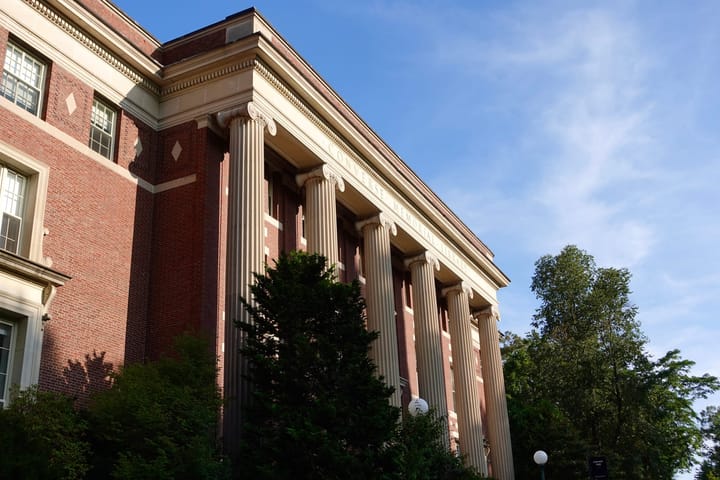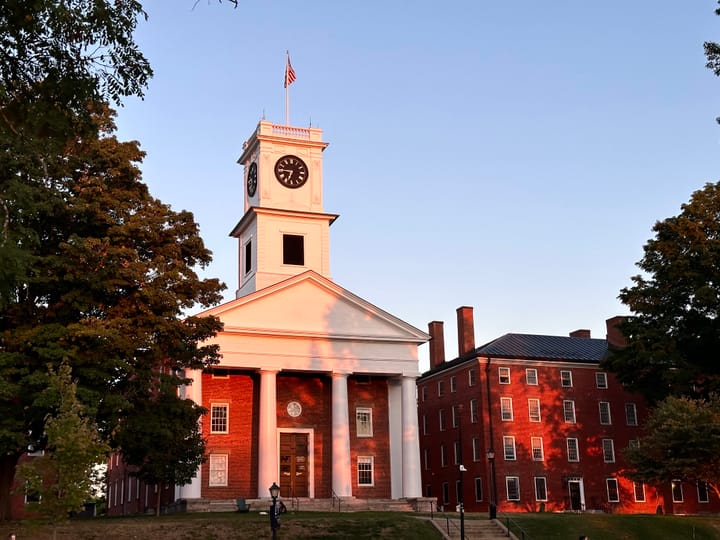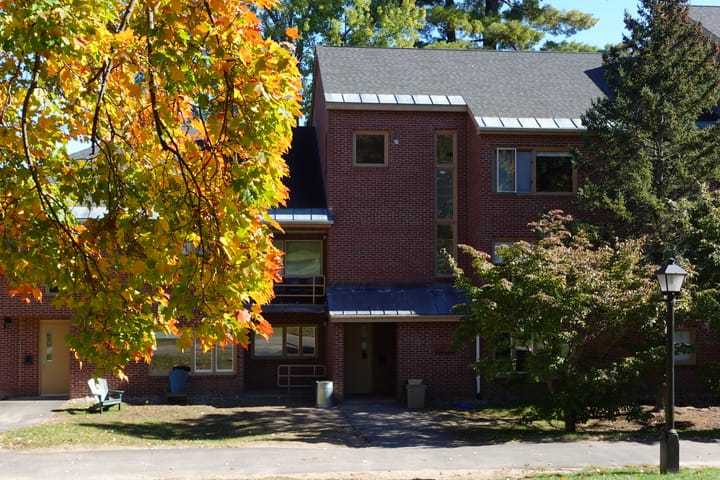Students Organize Panel on the History of the Gaza Strip
A coalition of student groups organized a panel of experts on the Middle East and Palestine as counter-programming to a talk by Bret Stephens. The panelists discussed the history of Israeli violence in the Gaza Strip and the racism of the modern Zionist movement.

A coalition of student groups invited experts on Palestine and the Middle East to speak at a panel event titled “Broadening Perspectives on Israel-Palestine” on Wednesday, Nov. 29. The student groups intended the panel to serve as alternative programming to a talk delivered by Bret Stephens, a controversial conservative New York Times columnist, organized by the president’s office, on the same day.
The panelists — Ahmad Samih Khalidi, associate fellow at the Global Fellowship Initiative of the Geneva Centre for Security Policy; Omar Dahi, professor of economics at Hampshire College; and Christopher Dole, professor of anthropology at Amherst — discussed the history of the the occupation of the Gaza Strip, what Zionism means, and the role of colleges and universities to educate their students on the conflict.
There was a brief statement from Kaia Jackson, a representative from Jewish Voices for Peace.
The student coalition group — made up of Amherst for Palestine, Jews for Ceasefire, the Muslim Students Association, and the Black Students Union — opened with a statement that questioned the administration’s decision to invite Stephens and criticized the lack of pro-Palestinian programming sponsored by the president’s office.
“We do not believe that the administration has successfully attended to their stated goal of stimulating an intellectual culture across differences of faith, background and perspective,” representatives of the coalition said of the Stephens talk.
Referencing Stephens’ columns for the New York Times and Wall Street Journal, the coalition said that his perspective “is steeped in over three decades worth of violent rhetoric against Palestinians and Arabs, against survivors of sexual-assault, and against Black Americans.”
The statement concluded with a demand that the president’s office “respect the dignity of our students, staff and faculty and others across the world by formally inviting a speaker this semester, who offers a viewpoint from the perspective of Palestinian liberation.” The coalition also demanded that “the college continues to move towards a balanced conversation that emphasizes voices from Palestinians themselves” into next semester.
President Michael Elliott said that the administration was already working to invite Palestinian and pro-Palestine speakers prior to the statement given at the panel.
The coalition highlighted that the President’s Office has not formally invited any Palestinian or pro-Palestine speakers. (Mohammad El-Kurd, a Palestinian poet and journalist who visited in November as part of a political science event series, was invited independently from the President’s Office.)
Elliott clarified to The Student that while his office did not invite El-Kurd, the office supported the event and ensured that it occurred.
“In response to [the administration’s] failures,” the statement continued, “our coalition has brought in speakers to educate ourselves and others on the current humanitarian crisis in Gaza and the West Bank, and the long history that has preceded it.”
Khalidi kicked off the panel discussion by delivering a history of the Gaza Strip. The history he recounted emphasized that Gaza’s politics and material conditions have been greatly molded by Israeli violence.
The story began, Khalidi said, in 1948, when 200,000 refugees from surrounding areas were driven into the Gaza Strip by military offensives that expelled them from their homes in order to establish the State of Israel.
“The Strip was utterly lacking in resources to support its [population],” Khalidi said.
Over the next 10 years, refugees forced to live in Gaza attempted to sneak back into their former homes in order to claim their possessions and harvest their crops. In response to these so-called “infiltrations,” the Israeli Defense Forces (IDF) killed 5,000 Palestinians, the majority of whom were unarmed, between 1949 and 1956.
Khalidi said that the first occupation of the Gaza Strip, which lasted six months, occurred from 1956 to 1957 during the British-French-Israeli invasion of Egypt, known as the Suez Crisis.
“The occupation only fed the anger and the frustration of a stateless, voiceless and dispossessed people living within eyesight of their former lands, with no real alternative means of development and no means of defense against Israel's military might,” Khalidi said.
1967, and Israel’s victory in the Six-Day War, marked the beginning of Israel’s second occupation of Gaza, which did not end until 2005. During this period, 21 Israeli settlements were set up in the Strip, occupying 50 percent of the total area, with an additional 20 percent of the land occupied by Israeli security areas.
Palestinian boycotts and peaceful demonstrations during the first years of the occupation gave way to armed resistance in 1970, Khalidi said. In response, the IDF killed 700 people, deported hundreds more to Egypt, and put 1,000 other Gazans in detention camps.
The Second Intifada in 2000 was another turning point in the history of the Gaza Strip, Khalidi said. Hamas, which had officially entered the political scene in 1987, sought to threaten Fatah’s authority as the leader of the Palestinian resistance movement in addition to the Israeli occupation itself.
This period also gave way to a pattern that has repeated all the way until the Oct. 7 attacks, Khalidi said: Israel engages Hamas militants of the West Bank, and Hamas responds with attacks from Gaza. Hamas then suggests a ceasefire encompassing civilians on both sides, which is refused by Israel. In response, Israel launches military offensives that leave hundreds of civilians dead and injured.
“As such, the cause and effect became impossible to untangle,” Khalidi said.
Although the Israeli settlements in Gaza were evacuated in 2005, Israel has maintained effective control of the Gaza Strip as defined by international law, Khalidi said. He emphasized that, while Israelis might maintain that the occupation ended after the evacuation of these settlements, for Palestinians as well as the international legal community, the occupation is ongoing.
“Israel’s wars have not been with Hamas, they’ve been with the people of Gaza, and by extension, with the people of Palestine everywhere,” Khalidi said.
He argued that the majority of Gazans are not “moved by” Hamas.
“They are moved by the history of forceful dislocation of repeated Israeli occupation, oppression and brute force, … by the sense of being caged and singled out for cruel and unusual punishment by Israel, by the Sisyphean sense of despair after each round of terrible destruction, and by perceiving the impotence and disinterest of the outside world,” Khalidi said, as he paused to hold back tears.
Following this account, Caden Stockwell ’25 moderated the panel discussion between the three speakers, asking about the importance of this history as it relates to the current crisis.
“This is the context that we need to understand: this continuous, sometimes fast, sometimes slow-moving, ethnic cleansing of Historic Palestine,” Dahi said.
Dahi also discussed the importance of global solidarity movements with Palestine, in light of the disregard for Palestine that surrounding Arab governments have shown in recent decades.
Stockwell asked the panelists to discuss the meaning of Zionism and the distinction between antisemitism and anti-Zionism.
Zionism means Jewish nationalism, Dahi said. Prior to 1948 and the founding of Israel, the realization of the ideology could have had many different iterations.
“[Since 1948], Zionism basically came to be associated with support for Israel as it was constructed, at the expense of Palestinian self-determination, [and] support for Israeli policies. Anti-Zionism became opposition to that expansionist, belligerent state,” Dahi said.
Khalidi emphasized that the Zionist movement was born as a response to European persecution of Jews and the European opposition to Jews assimilating in their societies. Early Zionists chose Palestine as an alternative homeland for Jews because of the biblical connection to the land.
“Now, there was a slight problem,” Khalidi said. “And that was that somebody else was on the land and had been there for more than a millennium and a half, and even before that. My own family is a testament to that.”
Khalidi also discussed the role of Great Britain in the establishment of Israel.
“Supporting this colonial enterprise was also part and parcel of Britain’s imperial outreach, particularly in terms of protecting the Suez Canal,” Khalidi said. “It also, by the way, got rid of the Jewish population and diverted it elsewhere. By that time, Jewish immigration into Britain was beginning to be perceived as a threat.”
Dole focused on the relationship between the current Israeli-inflicted violence on Palestine and the original ideals of Zionism.
“There’s a way in which the repression and everyday violence to which the Palestinians are subjected is framed as some sort of disfigurement or a corruption of the original Zionist project,” Dole said. “And I think it’s useful to think about, instead, the way that is a realization of … the internal principles of Zionism as a national project.”
Stockwell’s final question asked the speakers to reflect on the role of colleges and universities in this crisis and to share their thoughts on the college’s invitation of Bret Stephens to speak.
Dole said that the role of colleges is to create spaces for conversations and critical thinking.
As for the invitation of Bret Stephens, Khalidi said that “his odious views should be aired.”
“I say let him speak. But make sure that he … doesn’t get away with what he’s saying,” he continued, emphasizing that students should challenge Stephens on his views during his visit to campus.
Attendee Phoebe Nielsen ’25, who is a member of Amherst for Palestine, found the talk informative about the history of Israeli occupation.
“It’s a very common counterargument to calls for a free Palestine to say ‘this is a very complicated issue.’” they said. “I think what the three [panelists] made clear is that there is a very clear way that one can understand the violence that’s happening, and it’s actually crucial that we have that information as we’re fighting for liberation.”
Attendee Katherine Pulido ’27 shared that she attended the event because of the panelists’ extensive knowledge and her political alignment with the mission of Amherst for Palestine.
Pulido opted to attend the panel instead of the Stephens talk because Stephens “has a lot of opinions that I do not agree with, and I just thought that I’d rather go to the panelist talk, because I thought that they were very knowledgeable and would have effective conversations about the subject.”
Stockwell shared that the coalition of student groups “coalesced together to kind of do what the administration wasn’t and bring in pro-Palestine voices and have spaces for that perspective to be shared.”
After the event was fully planned, he said that the president’s office offered to send out a promotional email, but they reaffirmed that “the actual organization was a hundred percent students. The administration had no part in it.”





Comments ()